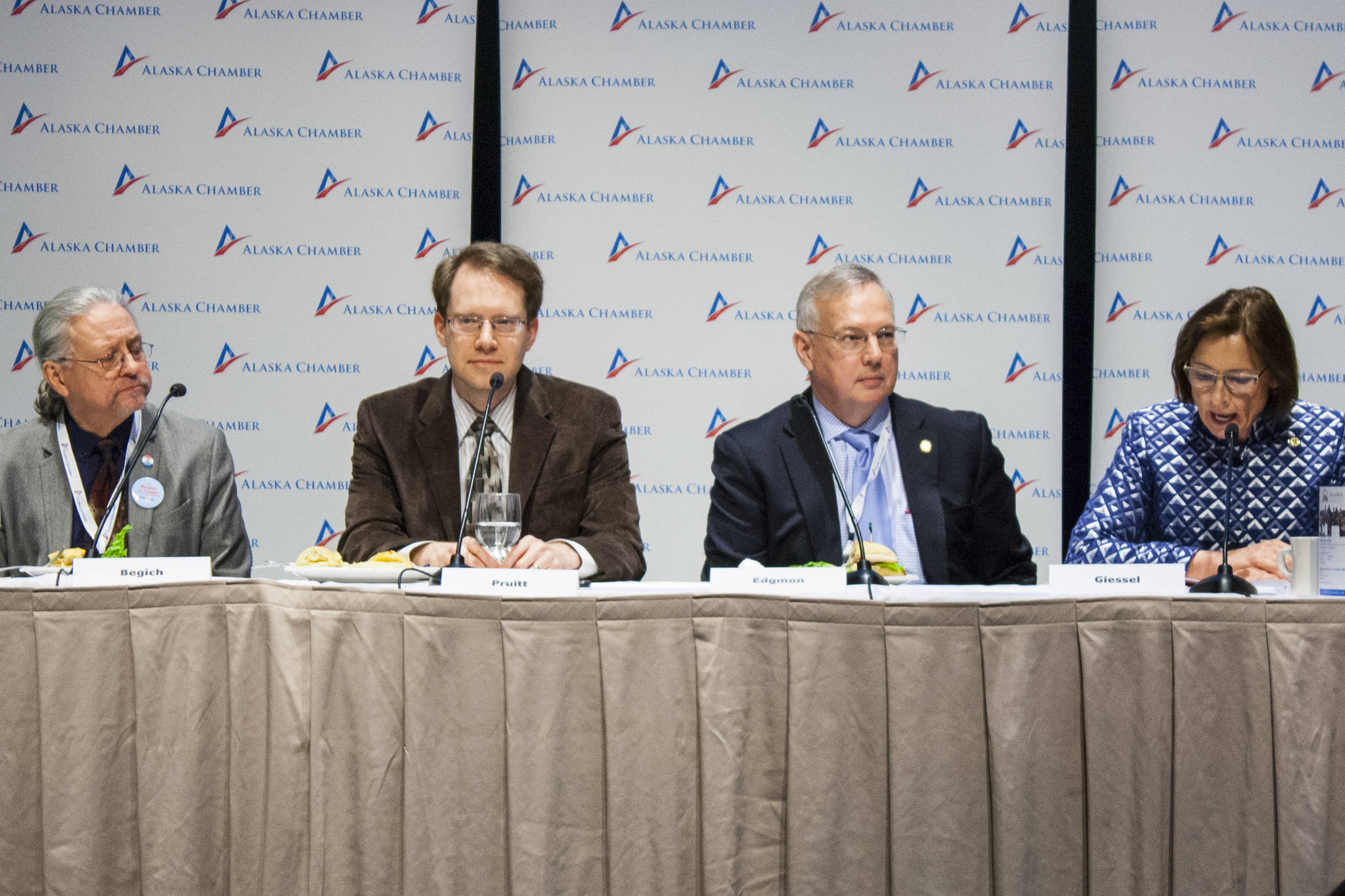Majority and minority leaders from both chambers of the Legislature said 2020 will not be a repeat of last year.
Senate President Cathy Giessel, R-Anchorage, Speaker of the House Bryce Edgmon, I-Dillingham, House Minority Leader Lance Pruitt, R-Anchorage, and Senate Minority Leader Tom Begich, D-Anchorage, told attendees at the Alaska Chamber’s Legislative Fly-In that they want this session to end on time and lawmakers are working together.
“We do not want a duplication of last year,” Pruitt said. “For those who were here, it was a difficult time.”
A member of the audience asked the lawmakers why they should believe this year will be different.
Edgmon said last year it took the House leadership about a month to organize, there was a budget-making process unlike any other in state history that led to a level of public interest he had never seen before and special legislative sessions held in dueling locations.
“You look back at all that, and you go, ‘For God’s sake, how could 2020 not be better?” Edgmon said with humor.
Plus, Edgmon said Gov. Mike Dunleavy has stepped up to the plate as well with a new chief of staff, Office of Management and Budget director and a budget proposal less drastic than last year’s proposed budget.
Begich cited his work with Gov. Mike Dunleavy on the Alaska Reads Act, a bill meant to improve reading performance throughout the state by third grade that has bipartisan support, as proof cooperation is possible.
Pruitt said a desire not to tarnish the institution of the Legislature is another reason to believe things will be different.
“I think the four people that you have sitting in front of you, I think I can confidently say this, they’re passionate about the institution,” Pruitt said.
While the lawmakers said to expect different results, much of the discussion at the chamber event was centered on well-worn topics — a government spending cap, the Permanent Fund Dividend and the Alaska Marine Highway System.
Giessel said she is “absolutely” in support of a viable Alaska Marine Highway System as evidenced by the recent joint session that included an attempt to override the governor’s vetoes and provide further funding to the ferry system that connects much of coastal Alaska.
[Once again, veto override fails]
She also shared she will be appointing Sen. Bert Stedman, R-Sitka to a nine-member working group to reshape the AMHS established by an administrative order from the governor.
“He’s done a lot of work on the marine highway,” Giessel said of Stedman. “I think he’s a perfect fit for that.”
All lawmakers said the PFD cannot continue to be an annual point of contention and debate.
“We have to get past it,” Edgmon said.
Pruitt said he hopes the statutory PFD formula is revisited during this session, and elected officials work together to create a new formula.
Similarly, all lawmakers offered at least tenuous support for a spending cap, but their takes on exactly how that would be determined and what it would practically mean differed.
Begich said he is not opposed to a spending cap, but there were need to be a plan in place and the cap would need to allow for paying for the state lawmakers want to build.
[What Alaska’s budget really needs is a tightened spending cap]
Edgmon said the impact of a cap would need to be carefully considered. He raised the hypothetical scenario of federal funding requiring matching state dollars that would put spending over the cap.
Pruitt said a cap is absolutely needed and had an idea for how it would be enforced.
“Put in that thing you can’t run for re-election if you don’t fit within that spending cap, and people will start figuring out a way to fit within that spending cap,” he said to a smattering of applause.
Giessel said a spending cap would be preparing for a day when the state has more money to spend and might not be especially needed in the present day.
“Frankly we have a spending cap right now, we don’t have any money,” Giessel said.
• Contact reporter Ben Hohenstatt at (907)523-2243 or bhohenstatt@juneauempire.com. Follow him on Twitter at @BenHohenstatt

